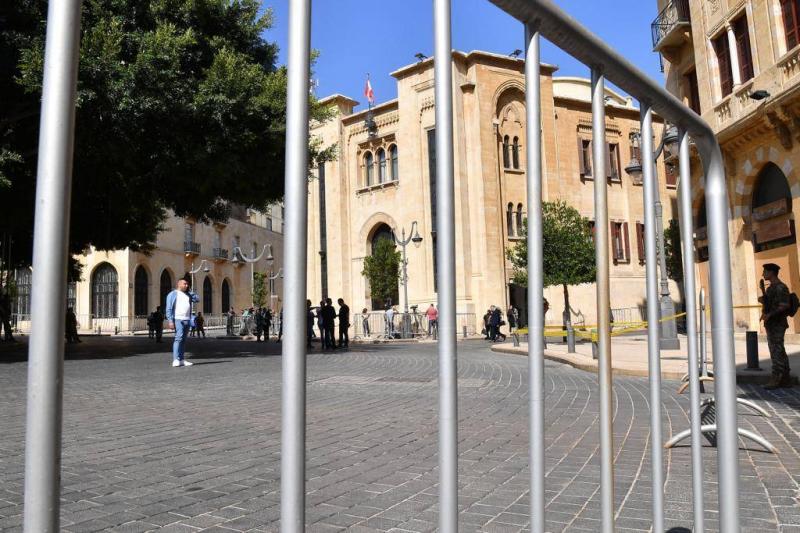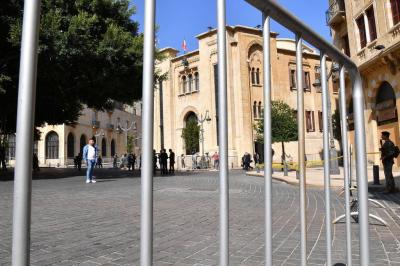Under the title "Lebanon Awaits an External Hand to Rescue It from Its Political Stalemate," Reuters presented an analysis of the political crisis in Lebanon amid the political forces' inability to elect a president.
Disputing Lebanese politicians await foreign intervention to resolve the crisis concerning who will occupy the presidential seat, leaving their country adrift as its crumbling institutions approach the brink of collapse. After the parliament's twelfth failure to elect a new president, many believe that what happens in the coming phase will depend on the influence of the warming relations between Saudi Arabia and Iran on the Middle East, with Lebanon historically serving as a battleground for the two major powers.
The stalemate is not surprising in a country whose political system is based on sectarian quotas and has alternated between crises since its independence, often leading to the intervention of foreign powers with influence over the competing factions. It was external powers that ended the Lebanese civil war, which lasted from 1975 to 1990, through the Saudi-backed Taif Agreement, and the same happened in 2008 when an agreement reached in Qatar prevented Lebanon from sliding into conflict.
The current situation is dire even by the standards of those two crises; the state has been drained by a financial collapse that has persisted since 2019. The army relies on Qatari and American aid. The dispute over who will hold the presidency, which is designated for the Maronite sect, pits "Hezbollah" and its allies against competitors from key Christian parties, giving the disagreement a clear sectarian flavor.
"Hezbollah" thwarted a last week's attempt by competitors to elect former minister Jihad Azour, who serves as the director of the Middle East and Central Asia Department at the International Monetary Fund, with the decision being put on hold after his nomination by the opposition forces for the presidency. Sources familiar with "Hezbollah's" perspective indicated they remain committed to their candidate, Sleiman Frangieh, sensing that regional developments are in their favor, especially after Riyadh welcomed Syrian President Bashar al-Assad.
However, neither Hezbollah nor its competitors have enough parliamentary members to impose the selection of either party. Conversely, Wael Abu Faour, a member of the "Democratic Gathering" bloc, stated, "Everyone is waiting now for someone to bring something from outside to take us all down from the tree," indicating a need to leverage the positive atmosphere in the region.
Meanwhile, Alaa Aoun, a member of the "Strong Lebanon" bloc, appears more cautious, telling Reuters, "All eyes are now focused on what the international communications may eventually yield," expressing his fear that nothing might come of the regional movement.
Saudi Arabia, the sponsor of the Taif Agreement, currently has other concerns, particularly regarding the conclusion of the war in Yemen. Lebanon has often been a secondary issue for Riyadh, especially since it has spent billions of dollars in the country without diminishing Hezbollah's dominance.
Lebanon is not at the top of Riyadh’s priorities. A senior Iranian official, speaking to Reuters anonymously, mentioned that the issue of Lebanon was briefly discussed in a recent meeting between the foreign ministers of Saudi Arabia and Iran. He added, "It's too early to believe that the Iranian-Saudi agreement will resolve all the issues in the region, but steps are being taken." He noted that Tehran welcomed Assad's return to the Arab fold and added, "With God's will, other issues, including the Lebanese issue, will also be resolved." He went on to say, "But Tehran believes this is an internal matter, and all relevant Lebanese parties need to overcome this stalemate through negotiations among themselves."
In a new attempt to break the deadlock, French President Emmanuel Macron spoke with Iranian President Ebrahim Raisi and Saudi Crown Prince Mohammed bin Salman regarding Lebanon. French diplomats say that the Saudi-Iranian breakthrough could have a positive impact, with Macron hoping to persuade Riyadh to support any potential compromises. French envoy Jean-Yves Le Drian headed to Beirut to consult with the parties, stating, "I have no options in hand; I will listen to everyone."
President Macron's efforts have repeatedly failed to resolve Lebanon's crises since the Beirut Port explosion in 2020, with many viewing the ruling political elite as responsible for obstructing reforms to protect their personal interests. Saudi analyst Ali Alshihabi indicated that Riyadh supports the French initiative, believing that the kingdom will back whoever France supports "whoever it may be." He added that Lebanon is not at the top of Riyadh's priorities.
Frangieh met with French officials in Paris in March, a visit seen by many in Lebanon as a validation for him, though France has not announced its support for any candidate, and others from the Maronite community are in the picture. U.S. Ambassador to Lebanon Dorothy Shea stated that it is up to Parliament to reach a consensus on selecting a president capable of working with the government to implement reforms. She added, "Much attention is focused on the rapprochement between Iran and Saudi Arabia and its potential impact on Lebanon." She stated, "We also hope to ease tensions in the region. But we also know that real change in Lebanon will not come from outside your borders; the future is in your hands, Lebanese people."




